Real Reasons for Not Signing
The first part of the article is here
By recording and analyzing all of this, one can believe that the Azerbaijani side was unexpectedly caught off guard by Armenia’s agreement to the last two points of the agreement. Therefore, attempts are being made to find other reasons to postpone the signing and ratification of the agreement as much as possible, since Baku does not find it expedient to hurry. There are several reasons for such behavior. First and foremost, Azerbaijan is not interested in losing the psychological advantages gained against Armenia through war, or the mechanisms of force or threat of force by establishing peace. In particular, through the mentioned statements about shootings, Azerbaijan managed to create a discourse of “imminent large-scale military operations” in Armenian society, as in previous years such statements were followed by Azerbaijani military actions.
The Azerbaijani authorities are also trying to manage the expectations of the international community, their own society, and Armenian society by reducing the overall optimistic effect of reaching an agreement. In this way, Aliyev is attempting to create opportunities to maintain psychological leverage even after the possible signing and start of implementation of the agreement.
Another motivation for delaying the signing and implementation of the peace agreement is the Azerbaijani authorities’ assumption that time is working in their favor. Therefore, there is no need to rush, as sometime later it might be possible to obtain more. Specifically, the events surrounding the Russian-Ukrainian war generate opinions that Russia might soon “free itself” from issues with Ukraine and focus attention on the South Caucasus. In Baku, they believe that in this case, as a regional ‘sub-hegemonic’ state, they have the best opportunities to realize a larger set of their own interests. At least one purpose of this logic is obvious: to obtain a transit road through Armenia’s Syunik region under the supervision of Russian special services.
Another motivation for Baku to delay the signing of the peace agreement is internal politics. The Aliyev regime has for years strengthened its power by presenting Armenia as an external enemy and rallying its society around an anti-Armenian agenda. Signing a peace agreement deprives the Azerbaijani authorities of their primary toolset in the internal political field. Considering the deplorable state of human rights and freedoms in that country, about which numerous human rights organizations have made dozens of statements, the exhaustion of the external enemy agenda could pose real dangers for the ruling authoritarian regime.
The last possible reason but perhaps the most significant at this moment is that they do not consider in Azerbaijan that the peace agreement signed at this moment brings equal benefits to both sides. For Armenia, the peace agreement with Azerbaijan means regulation with Turkey, more effective cooperation with the West and primarily Europe (via Turkey’s territory), less Russian influence, and regular development for Armenia. For Azerbaijan, tangible changes are not observed at least at this moment. This should be understood by reading the following lines from pro-government Azerbaijani experts: “This is when the rarely discussed and often overlooked issue of ‘dividends of peace’ becomes pertinent. As things stand, it is unclear the extent to which Azerbaijan would benefit from ‘immediate’ peace…”. Thus, in Azerbaijan, they seem to have expectations that either Armenia or other parties interested in peace will offer some additional ‘calories’ in exchange for that peace – the nature of which I have already partially outlined in the commentary on the US statement. For this purpose, Azerbaijan is ready to announce an auction for its signature under the peace agreement. And when that price is considered sufficient, the constitutional and other imaginary requirements will be consigned to oblivion, and conversely, if that price is not considered adequate, new illogical demands will be pushed forward.
Developments and Issues in Other Negotiation Directions
At the same time, the parties are conducting separate negotiations on communication unblocking and the delimitation and demarcation of the Armenia-Azerbaijan state border.
Until very recently, the only format for negotiations on communication unblocking was the already two-year-old essentially non-functioning trilateral negotiation format at the level of deputy prime ministers of Armenia, Azerbaijan, and Russia. However, in November 2024, Armenia sent written proposals to Azerbaijan on the topic of communication unblocking, thereby actually trying to shift negotiations from a trilateral to a bilateral format, but so far Armenia’s proposals remain unanswered. In parallel, Azerbaijani analytical and political circles continue to reproduce the November 9th discourse and an extremely arbitrary, one could even say perverted interpretation of “unhindered” connection. In essence, what the Azerbaijani side demands at the negotiating table is not an unhindered connection, but an exterritorial corridor. The phrase itself is no longer used because in 2021-22, Azerbaijan realized that this term is a trigger for the West and Iran. As a result, the term has been replaced, but not the content.
The other direction involves negotiations on the delimitation and demarcation of the Armenian-Azerbaijani border, and here the Armenian side is waiting for the Azerbaijani side to return to the practical implementation of agreements reached on the ground. It should be noted that all conditions for this have already been created, and all principles have been coordinated; all that remains is to get to work. The first phase of the much-drummed demarcation and delimitation has been made possible exclusively through the goodwill and unilateral concessions of the Armenian side.
Moreover, one should not forget the humanitarian issues that can contribute to reconciliation between societies. The return of all Armenian prisoners of war is the most urgent and important issue in this context, also from a moral standpoint. Meanwhile, the Azerbaijani side treats this issue as a bargaining chip.
Conclusion
Thus, from this moment on, the peace agreement is ready to be signed, and yes, this is a peace agreement. This is not a small step; this is not a framework agreement – this is the big document itself. All attempts to minimize this document are dishonest, all attempts to call it a “rapid peace” are incomprehensible because this is a document negotiated for over 4 years and finally coordinated. Sometimes a cigar is just a cigar, no matter how much people want to see something else instead. Today, only the official Baku’s intransigence, illogical demands, expectation of additional ‘calories’ and hostile public rhetoric are preventing its signing and establishing peace in the South Caucasus (which could happen for the first time in the history of the independent states of Armenia and Azerbaijan). Overcoming the conflict can bring stability to the entire region against geopolitical cataclysms and interventions, create opportunities for economic development and prosperity, and lead to closing the bloody pages of history of two neighboring peoples – both of whom have paid dearly enough for this war. It is necessary to record that from this moment on, anyone on both sides of the border who speaks of preconditions, justice, old disputes, and vengeance is simply reproducing the conflict. When one side begins to present a long list of its sufferings, losses, and problems, the opposite side can certainly do and does the same. But after decades of conflict, the peace agreement text is ready, and at least experts and political actors should try to approach the conflict with a post-conflict vocabulary and logic.
Both Armenia’s and Azerbaijan’s domestic political situations, as well as events happening in the external world at this moment, make the signing of a peace agreement between the Republic of Armenia and the Republic of Azerbaijan possible. For this, it is necessary that the EU support for Armenia and the new US administration’s neutral involvement in the process as an agreement guarantor are swiftly increased.
Areg Kochinyan


